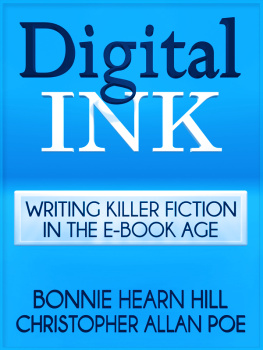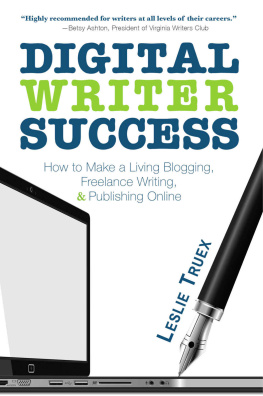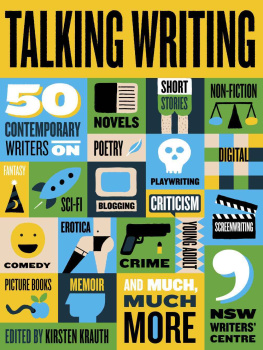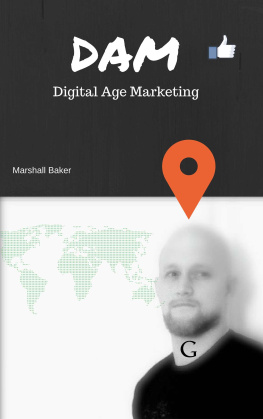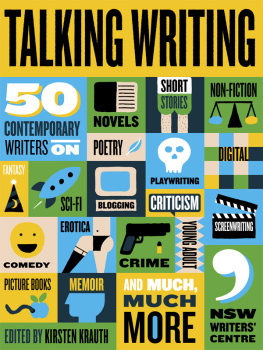ABOUT THE AUTHORS
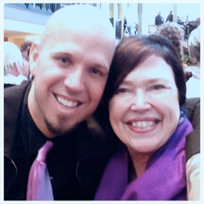
Bonnie Hearn Hill is the author of six thrillers, four young adult novels, and numerous nonfiction ghost- and co-authored titles. A former newspaper editor, she is a founding member of International Thriller Writers and co-founder of the Yosemite Writers Conference. She writes articles on the craft of writing for Publishers Weekly and Writer's Digest among others, and she leads online and real time workshops.
Christopher Allan Poe is an author and touring musician based in Los Angeles. He writes paranormal fiction, with an emphasis on social issues involving women and children. A member of International Thriller Writers, he has been accepted into the ITW Debut Authors program for his paranormal thriller, THE PORTAL.
Bonne and Chris speak at conferences across the country, and they love hearing from writers. To post question for their newsletter, visit:
www.DigitalInkBooks.com
ACKNOWLEDGMENTS
We are grateful to the following for their encouragement and feedback.
Lawrence Fisher
Dennis Caeton
Angelica Carpenter
Hazel Dixon-Cooper
Elbie Groves
Larry Hill
Brandi Hitt
Genevieve Hinson
Dennis Lewis
CHAPTER ONE
YOUR PROTAGONIST: WHOS DRIVING YOUR STORY?
Before we take one step forward, lets start with the development of your protagonist, also known as the leading character, hero, or heroine of your story.
This is one of the most important chapters in this book, so dont go skipping ahead looking for shortcuts. There are none. We dont care if youre the mutant hybrid child of Ernest Hemingway and the Dalai Lama. No competent author would ever gloss over the development of her protagonist.
Until you have a strong protagonist, youve got nothing but a daydream that will vanish into thin air the minute you cough. If you get your protagonist wrong, well, you might as well take your ball and go home, because the game is over. Problematic manuscripts almost always begin with a flimsy protagonist.
You might be saying, I dont need to know my protagonist. Hes just like me.
Theres no nice way to tell you this, so lets be blunt. You are just not that interesting, at least not enough to be your own protagonist. Nobody is. Creating an engaging character to drive the vehicle of your novel will take more than a glamorized look at your own life. It will take hard work.
Be careful here. Writers trap 101. Once you start exploring your protagonist in depth, or any character for that matter, all sorts of outlandish plot ideas will pop into your mind. Theyll whisper in your ear. What about a blind woman with amnesia? Or an Egyptian relic hidden in the Arctic Circle? Ooh, ooh. What about steampunk werewolves? Wouldnt that be a much better idea to write than this stupid book?
Do not listen to those voices. Character development is the most difficult part of the writing process. Your mind will almost certainly try to lead you away from doing the real work of writing. It happens to all of us. No one really knows why, but its probably because character development requires an author to poke around in some uncomfortable places in his unconscious.
In any case, treat those plot voices like squealing pigs. Nothing more. Sure, theyll fuss and theyll snort, but you dont have to pay attention. Scribble that great idea in a sentencethats one sentence, not twoand shove it in a folder for later. Then, take the time to get to know your protagonist and bring her to life by using the following techniques.
Does your protagonist have the right engine to race?
Have you ever wondered why certain protagonists bring you to tears and pick at your brain long after youve put that book down? Why do some protagonists become ingrained in our collective psyche?
Protagonists are the most important characters in our stories. They are the people to whom we relate. Just like us, they are the engines that drive their stories. They race your plot forward, swerve around obstacles, and yes, sometimes barrel over the antagonists in their paths.
Sometimes the antagonist barrels over them. Is your protagonist a sleek, nitrous-injected Corvette, or is he a Gremlin so meek and sickly, that even you, the author, feel the need to get out and push?
Be honest. Your protagonist has room for improvement, right? Otherwise, youve probably wasted your money on this book. Besides, if youre one of the chosen few golden authors, whose glorious protagonist could never be improved, youve got bigger problems anyway.
All protagonists have room for improvement. Fair enough, but how do we authors beef them up? There are laws of gravity, thermodynamics, and government, but are there rules to help steer great protagonists?
The answer is yes. Let us be clear, though. There are no guarantees that anyone can create those characters that become household names. Scarlet OHara. Travis McGee. Lestat. Jason Bourne. Easy Rawlins. Stephanie Plum. Some of that has to do with timing, pixie dust, and whether or not Hollywood signs on.
How would you define the traits of a great protagonist? Intelligent? Warm? Giving? Clever? Brave? Those are perfectly good traits, but theyre absolutely optional. If you only have these, youre running the risk of a perfect character. Whats wrong with that? Nothing, if youre a fan of unicorns and daisies, but how then do you account for the fact that some of the finest protagonists throughout history have shown signs of selfishness, anger, and jealousy? Hell, Henry DeTamble from The Time Travelers Wife spends most of his days beating up and robbing people. Yet we feel no less for him.
Have you ever known a perfect person or someone who pretends to be? We all have at one time or another. What happens when you encounter these people in real life? Do you like them? Can you relate to them? Can you stand to spend any time in their presence? Case closed.
If you want to touch hearts and sell books, your protagonist needs only two basic traits. Think for a moment. What two qualities can allow you to forget plot and trust your story with this character youve created? These two. Your character must be proactive, and your character must be sympathetic.
Memorable protagonists protag .
In other words, they must be proactive. Great protagonists know what they want, and theyre willing to go after it with all the resources at their disposal. They protag.
What wouldve happened in the Game of Thrones series if Eddard Stockard had simply decided that he wasnt honor bound to be the Hand of King Robert? No war wouldve ensued. No conflict. No reason to keep reading.
A proactive character is not a victim. Believe us, victims are no more interesting in fiction than they are in real life. Remember some of those stereotypical and oh-so-sexist romance novels of the seventies where the heroines dont do much more than look beautiful and put themselves in dangerous situations?
Dont go to the tower room, the hero warns her.
Then at midnight, she sees a light and thinks : Oh, my. Someones in the tower room. I think Ill take a look.
Sure enough, its the crazy uncle whos been kept there all these years. And now, he has her in his clutches. His bony fingers dig into her throat. The room begins to blur. She cant breathe.
And thenAnd then
Its the hero! He rescues her, carries her down the staircase, and shes a happy camper. Stupid, but happy. Who wants to relate to her?
Todays proactive character cant depend on someone else to rescue her, and she certainly cant be the ditz who goes to the tower room at midnight.
Strong protagonists dont have time to stare into mirrors, describing themselves in bouts of introspective sad-boy life histories. By the way, if you have one of those scenesand we all have at one pointyou have to cut it. Sorry, you just do.
Next page
